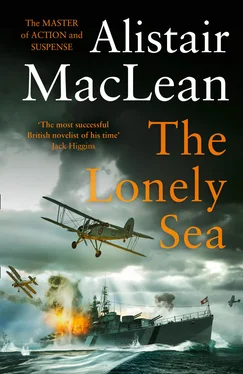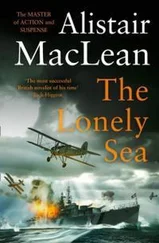And fought them both he did. Three times the Scharnhorst ordered him to abandon ship, and on the third time it had its answer—a salvo that fell just short. At the same time, a salvo from the Rawalpindi struck the Gneisenau amidships, and almost together the two German battle cruisers replied with heavy, accurate and devastating close-range fire.
The first salvo from the Scharnhorst crashed into the Rawalpindi’ s high superstructure, wrecking the boat-deck and killing almost everyone on the bridge: but Captain Kennedy survived. Almost immediately, another salvo of 11-inch shells, this time from the Gneisenau, crashed into the main control room of the Rawalpindi, and turned it into a lifeless shambles: all semblance of concerted fire now ceased, but the seven guns—one had already been destroyed—fought on independently.
The fires amidships were already beginning to take hold as yet another salvo sliced through the tissue-thin sides of the liner and exploded deep in its heart. One of these blew up in the engine room, completely destroying the dynamos, and this was the blow that effectively carried into execution Kennedy’s sentence of death. With the dynamos gone, the electricity supply was destroyed: and the shell hoists from the magazines were worked by electricity.
Kennedy, still fighting with his wrecked ship, from the twisted wreckage that was all that was left of his bridge, issued instructions that every available member of the crew should assist in manhandling shells up from the magazines and rolling them across the heaving, shell-swept deck towards those guns that still kept firing: there were only five left now.
That exposed deck of the Rawalpindi, raked by screaming shrapnel and jagged twisted steel, became a blood-soaked abattoir for those who fought to reach the empty breeches of the waiting guns. Some carriers were killed outright, and their shells rolled from side to side with the movement of the ship, through the ever-growing flames and over deck-plates beginning to glow dull red from the heat of the internal fires. Other men were wounded, but ignored their agony: one incredibly gallant man, both legs smashed, wounded to death, and with a shell clutched in his one sound arm, dragged his way along the deck, groping blindly for the breech of the gun that he could not see, swearing that he would get them yet.
The battle was grotesquely one-sided. Shells still crashed into the dying Rawalpindi and the end could not be long delayed. Loose ammunition was falling into the fires and exploding far beneath. The entire ship, excepting only the poop and fo’c’sle, was a leaping, twisting map of flame. One by one the guns fell silent, as the enemy destroyed them, as the crews died beside them and the supply of ammunition, cut off by walls of flame, finally stopped altogether.
As a fighting unit the Rawalpindi was finished, beaten into silence and submission, all but dead in the water. But the sixty year-old Captain Kennedy was a man who was literally incapable of conceiving of the idea of defeat. He left his shattered bridge, groped through the blazing ruins of the superstructure and along the deck towards the poop: if he could only drop some smoke floats, he thought, he might still sail the Rawalpindi to safety. His ship was holed and sinking, damaged beyond help or repair and visibly dying: his guns were gone, his crew was decimated, but still he fought for survival. Such indomitable courage, such unyielding tenacity of purpose when all reason for purpose has long since vanished lies barely within the realms of comprehension.
Captain Kennedy vanished into the smoke and the flame, and died.
He was not long survived by his ship or by all except a tragic minority of the crew that had so magnificently served both himself and the Rawalpindi. Another shell from the Scharnhorst brought the coup de grace—a tremendous roar and a column of white flame lancing high into the gathering gloom of the evening as the erupting main magazine blew out through the sides and deck and burning superstructure and almost severed the Rawalpindi in two.
The guns of the Scharnhorst and Gneisenau fell silent: every salvo now could only be so much wasted ammunition. For the handful of men still left alive aboard the Rawalpindi nothing could be achieved by remaining where they were but a death swifter and even more certain than that offered by the ice-cold waters slowly climbing up the rent and gaping sides of the sinking ship.
Miraculously, almost, two of the lifeboats had survived the ferocity of the Germans’ shells, and those few men—twenty-seven in all—who were able, slid down the falls and pulled desperately away from the blazing Rawalpindi : at any moment an explosion might reach out and destroy them, or destroy the ship and pull them after it as it sunk swiftly down to the deep floor of the ocean.
These men, picked up by the German ships, were the only survivors apart from a handful rescued the following morning. Most of the others had been killed by shell-fire, burnt to death or trapped below decks and drowned in the rising waters. Some men who could not reach the lifeboats, jumped into the sea, searching frantically for broken bits of boats, oars, wreckage, anything that would offer even a passing moment’s security before the numbing cold struck deep and their hearts just stopped beating. And many there were, scattered here and there over the decks and in passages and compartments below, too desperately wounded either to move or to call out, who just sat or lay waiting quietly for the end, for the blessing of the freezing waters that would bring swift release from their agonies.
Two hundred and forty men went down with the Rawalpindi, and, in light of the fanatical courage with which they had served both their ship and their commander, it is perhaps not too far-fetched to think that some of those who were still alive when the waters closed over them at 8 o’clock that evening may have derived no little consolation from the thought that if they had to go down with their ship, they could have asked no greater privilege than to do so in the incomparable company of Captain Edward Kennedy.
Конец ознакомительного фрагмента.
Текст предоставлен ООО «ЛитРес».
Прочитайте эту книгу целиком, купив полную легальную версию на ЛитРес.
Безопасно оплатить книгу можно банковской картой Visa, MasterCard, Maestro, со счета мобильного телефона, с платежного терминала, в салоне МТС или Связной, через PayPal, WebMoney, Яндекс.Деньги, QIWI Кошелек, бонусными картами или другим удобным Вам способом.












